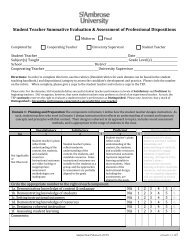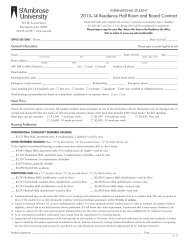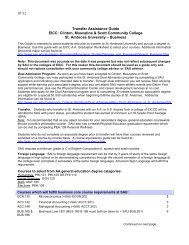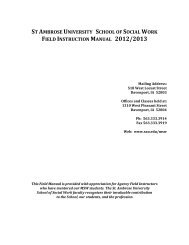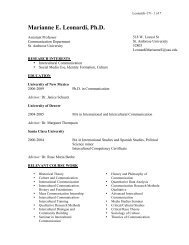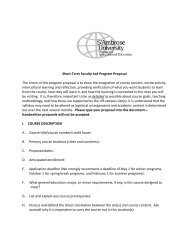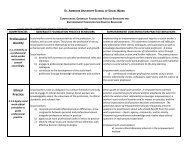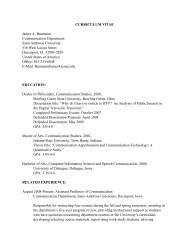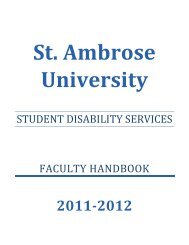St. Ambrose University 518 West Locust Davenport Iowa 52803 admit
St. Ambrose University 518 West Locust Davenport Iowa 52803 admit
St. Ambrose University 518 West Locust Davenport Iowa 52803 admit
Create successful ePaper yourself
Turn your PDF publications into a flip-book with our unique Google optimized e-Paper software.
Graduate Curricula<br />
client/server design on the Internet. Prerequisites:<br />
CSCI 360 or equivalent.<br />
CSCI 570. Advanced Computer Networks and<br />
Data Communications<br />
3 credits<br />
An in depth presentation of network topics such<br />
as network protocols, topologies, frame relay,<br />
ATM, virtual networks, WAN, encryption, and<br />
other current topics. <strong>St</strong>udents will be introduced<br />
to a standards based study of networking technologies.<br />
Prerequisites: CSCI 370 or equivalent.<br />
CSCI 600. Systems Analysis in the<br />
Enterprise<br />
3 credits<br />
An exploration of the phases in the development<br />
of an information system, the major activities<br />
that occur during the analysis and design phases;<br />
the selection and use appropriate analysis tools;<br />
data analysis and logical design of information<br />
system. Advanced techniques, used in the analysis<br />
and design of Information Systems; are presented<br />
including QRAD (Quality Rapid Application<br />
Development), YSM (Yourdon Systems Method),<br />
JAD (Joint Aided Development), CASE<br />
(Computer Aided Software Engineering), Object<br />
Oriented Analysis and Client/Server Analysis.<br />
Prerequisites: CSCI 300 or equivalent.<br />
CSCI 610. Advanced Programming<br />
Languages<br />
3 credits<br />
A study of advanced programming techniques for<br />
developing various application systems. Topics<br />
include: graphical user interface development<br />
using AWK, JFC, and Swing; distributed applications<br />
development using CORBA; dynamic Web<br />
page development using Perl, including objectoriented<br />
Perl and APIs for linking with C/C++<br />
and Java; and Client/Server system development<br />
using JDBC. Prerequisites: C++ programming.<br />
CSCI 640. Legal and Ethical Issues in<br />
Computing<br />
3 credits<br />
The course explores legal, ethical and social<br />
implications of computing from a computing and<br />
network professional’s point of view. It covers<br />
the issues professionals will face in computerrelated<br />
fields such as the impact of electronic<br />
media on intellectual property, privacy threats<br />
from government and business databases, censorship<br />
of the Internet, government censorship on<br />
encryption, and hacking and computer crimes.<br />
CSCI 650. Project Management and<br />
Control<br />
3 credits<br />
Addresses the business and control aspects of<br />
managing projects. <strong>St</strong>udents will learn how to<br />
accurately estimate a project’s scope, schedule,<br />
budget, and staffing needs. Project control will<br />
also be addressed, paying particular attention to<br />
critical-path monitoring, activity dependencies,<br />
activity lead-lag times, avoiding “scope creep”,<br />
and critical resources management.<br />
CSCI 660. Computers and Commerce 3 credits<br />
This course examines the benefits and risks associated<br />
with the computerization of specific business<br />
processes. The information technology infrastructures<br />
required to support such automation<br />
are also addressed. The course includes a substantial<br />
hands-on project through which students<br />
encounter the skills and tools required to produce<br />
an e-commerce site.<br />
CSCI 700. Software Engineering 3 credits<br />
Theory and practice of software engineering,<br />
including software life cycle and development<br />
models; software requirement analysis; and software<br />
design, coding, and maintenance. Advanced<br />
software engineering, including software maturity<br />
models, cost specification models, software reliability<br />
models, software complexity, quality control<br />
and experience report. Prerequisites: C++<br />
programming.<br />
CSCI 750. Enterprise Resource Planning 3 credits<br />
Provides the student with a background of ERP<br />
systems and the capabilities of systems, such as<br />
SAP, People Soft, etc.. Focus is on the ERP life<br />
cycle from the decision to adopt an ERP system<br />
to the time when the system goes ’live.’ Risk<br />
assessment associated with the adoption of ERP<br />
234




